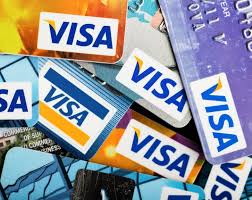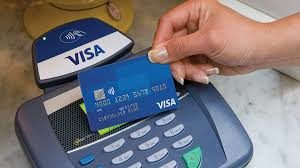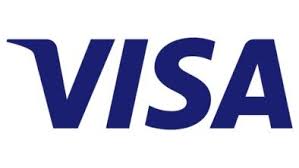Visa has its roots in the 1958 launching of Bank of America‘s BankAmericard program, where 60,000 pre-approved unsolicited credit cards were mailed out in Fresno, California.
The BankAmericard was the first all-purpose credit card on the market, replacing the individual merchant accounts that consumers had until that time.
This experiment ultimately failed, but the company later realized that the idea was salvageable by implementing proper financial controls and publishing an open letter to 3 million households apologizing for the fiasco.
 By the time mailings of unsolicited credit cards was outlawed in 1970, 100 million BankAmericard credit cards had been distributed in the United States.
By the time mailings of unsolicited credit cards was outlawed in 1970, 100 million BankAmericard credit cards had been distributed in the United States.
In 1970 Bank of America gave up control of the program. The various BankAmericard issuer banks created National BankAmericard Inc (NBI), an independent corporation, to be in charge of managing and promoting the card.
IBANCO was formed to manage the international BankAmericard program.
 The name “Visa” was created by IBANCO founder Dee Hock. He believed the word was recognizable in many languages.
The name “Visa” was created by IBANCO founder Dee Hock. He believed the word was recognizable in many languages.
Today Visa is a multinational financial services corporation. Visa facilitates electronic funds transfers, most commonly through Visa-branded credit cards and debit cards.
 Visa trades publicly on the New York Stock Exchange under the symbol V, is a member of the S&P 500, is #66 in FT Global 500, is #260 in the Fortune 500, has 17,000 employees, and had $20.609 billion in revenue in 2018
Visa trades publicly on the New York Stock Exchange under the symbol V, is a member of the S&P 500, is #66 in FT Global 500, is #260 in the Fortune 500, has 17,000 employees, and had $20.609 billion in revenue in 2018
The company is the world’s second-largest card payment organization. Visa has operations across all six continents. Nearly all Visa transactions worldwide are processed through the company’s directly-operated VisaNet at one of four secure data centers, located in Ashburn, Virginia, Highlands Ranch, Colorado, London, England, and Singapore. These facilities are heavily secured against natural disasters, crime, and terrorism. They can operate independently of each other and from external utilities if necessary and can handle up to 30,000 simultaneous transactions and up to 100 billion computations every second.
Food giant Kroger has slowly been banning Visa card use due to their high fees, with the most recent announcement in March 2019 that it would no longer accept Visa cards for payments at their Smith’s Food and Drug stores beginning April 3rd, 2019.
Visa
History
Visa has its roots in the 1958 launching of Bank of America‘s BankAmericard program, where 60,000 pre-approved unsolicited credit cards were mailed out in Fresno, California.
The BankAmericard was the first all-purpose credit card on the market, replacing the individual merchant accounts that consumers had until that time.
This experiment ultimately failed, but the company later realized that the idea was salvageable by implementing proper financial controls and publishing an open letter to 3 million households apologizing for the fiasco.
 By the time mailings of unsolicited credit cards was outlawed in 1970, 100 million BankAmericard credit cards had been distributed in the United States.
By the time mailings of unsolicited credit cards was outlawed in 1970, 100 million BankAmericard credit cards had been distributed in the United States.
In 1970 Bank of America gave up control of the program. The various BankAmericard issuer banks created National BankAmericard Inc (NBI), an independent corporation, to be in charge of managing and promoting the card.
IBANCO was formed to manage the international BankAmericard program.
 The name “Visa” was created by IBANCO founder Dee Hock. He believed the word was recognizable in many languages.
The name “Visa” was created by IBANCO founder Dee Hock. He believed the word was recognizable in many languages.
Today Visa is a multinational financial services corporation. Visa facilitates electronic funds transfers, most commonly through Visa-branded credit cards and debit cards.
 Visa trades publicly on the New York Stock Exchange under the symbol V, is a member of the S&P 500, is #66 in FT Global 500, is #260 in the Fortune 500, has 17,000 employees, and had $20.609 billion in revenue in 2018
Visa trades publicly on the New York Stock Exchange under the symbol V, is a member of the S&P 500, is #66 in FT Global 500, is #260 in the Fortune 500, has 17,000 employees, and had $20.609 billion in revenue in 2018
The company is the world’s second-largest card payment organization. Visa has operations across all six continents. Nearly all Visa transactions worldwide are processed through the company’s directly-operated VisaNet at one of four secure data centers, located in Ashburn, Virginia, Highlands Ranch, Colorado, London, England, and Singapore. These facilities are heavily secured against natural disasters, crime, and terrorism. They can operate independently of each other and from external utilities if necessary and can handle up to 30,000 simultaneous transactions and up to 100 billion computations every second.
Food giant Kroger has slowly been banning Visa card use due to their high fees, with the most recent announcement in March 2019 that it would no longer accept Visa cards for payments at their Smith’s Food and Drug stores beginning April 3rd, 2019.

